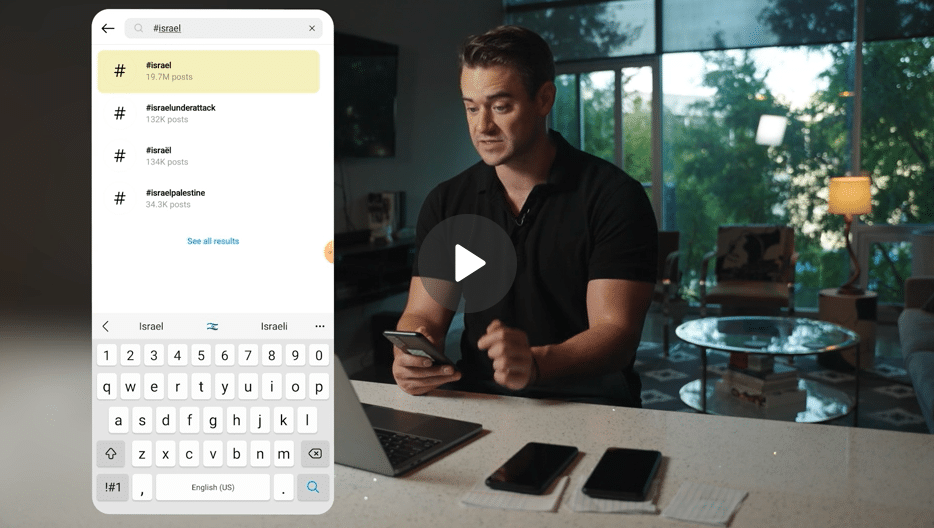Decimated neighborhoods. Injured children. Terrorized festivalgoers running for their lives. Since the brutal war between Israel and Hamas began nearly three months ago, Maddy Miller, a 17-year-old high school senior in Dallas, Texas, has been trying to make sense of the horrific scenes unfolding daily on her phone.
“I’ll just open TikTok or Instagram and it’s like, ‘here’s a clip from inside Israel or inside Palestine,'” Miller said. “Sometimes I just need to sit down for like 10 minutes and actually figure out what’s happening. It’s hard to know what’s real and what’s fake.”
In February 2022, the war in Ukraine began to play out on Tik Tok and Instagram. The conflict in the Middle East is now the second war to be viewed in vivid, and often intimate, vignettes on social media, where 51% of younger Gen Z teens get their news, according to a Deloitte survey. The war between Israel and Hamas has also sparked a tidal wave of misinformation and disinformation, which is reaching American teens like Miller.
[The CBS News Report continues]
Media literacy classes
As part of every lesson, Brandon Jackson teaches students the tools needed to spot misinformation, which is false or misleading, and disinformation, which is deliberately deceptive. He also tests his students using real-world examples of fake videos that circulate on social media.
Despite the technological edge young Americans have over older generations, Stanford University researchers Sam Wineburg and Joel Breakstone say teenagers’ ability to identify misinformation on social media is concerningly low.
[The CBS News Report continues]
“The video purported to claim to show voter fraud in the United States,” Breakstone explained. “If you did a quick internet search, within 30 seconds you could discover that the video actually showed voter fraud in Russia. However, out of those more than 3,000 students, how many students actually discovered the link to Russia? Three. That’s less than one-tenth of 1%.”
The experiment
A CBS News investigation revealed how quickly mis- and disinformation is reaching teenage accounts on social media. In an experiment, a team of journalists set up three different profiles on Instagram and TikTok.
One account searched simple terms on Israel; another searched simple Palestinian terms; and the last account searched both. Each alias also followed several accounts with more than 1,000 followers and “liked” a handful of posts for each one.
[The CBS News Report continues]
“The same tip that I give every single time is to slow down,” said Evon. “Look for authenticity; look for the source; look for evidence; look for reasoning and to look for the context.”
“More dangerous paths”
From the highly publicized resignation of the president of the University of Pennsylvania, to high school walkouts in San Francisco and New York City, the war has undeniably created a tense climate in schools nationwide. Reports of antisemitic and Islamophobic threats and violence have soared.
“It doesn’t feel like we’re living in 2023. Feels like we’re living in Nazi Germany,” one student said.
Experts like Evon, Breakstone and Wineburg said false or misleading information can intensify the already heated debates about this conflict.
“When young people are developing their views about the world, false claims alter that,” Evon said. “They drag people down more dangerous paths.”
[The CBS News Report continues]
Response from TikTok
CBS News discussed the experiment findings with spokespeople from TikTok. After the team sent the company links to examples of misinformation, those posts were removed.
“TikTok works relentlessly to remove harmful misinformation, and partners with independent fact-checkers who assess the accuracy of content in more than 50 languages,” a TikTok spokesperson said. We’ve removed more than 131,000 videos for misinformation since the start of the Israel-Hamas war and direct people searching for content related to the conflict to Reuters.”
[The CBS News Report continues]
Response from Meta about Instagram
“We’ve taken significant steps to fight the spread of misinformation using a three-part strategy – remove content that violates our Community Standards, flag and reduce distribution of stories marked as false by third-party fact-checkers,” a Meta spokesperson said. “We also label content and inform people so they can decide what to read, trust and share.”
View this CBS News Report from December 19th

